Invisibility and the struggle to be seen
When it comes to superpowers, I’d pick flying over invisibility. Harry Potter’s cloak of invisibility doesn’t excite me. I’d rather you couldn’t see me because I was in the sky than have you look through me without seeing me.
As a child I felt invisible. Invisible enough not to be bullied. Invisible enough not to find myself at the centre of any of the dramas that plague high school friendship groups. For the first two decades of my life, I lived like I was in an impenetrable bubble, looking out at humans doing human things.
Far from being a superpower, it would seem that invisibility is a curse for many women — and arguably all of womankind.
In Wifedom: Mrs Orwell's Invisible Life, a creative biography by Anna Funder, we learn how Eileen O’Shaughnessy is a talented and independent woman until she meets and decides to marry George Orwell. In doing so, she gives up her career and enables his, even as he goes out of his way to omit her from his writing. (I wrote a little more about this excellent book in my previous post).
In The Invisible Life of Addie LaRue, a historical fantasy by V. E. Schwab, a young woman gains immortality in a Faustian bargain but is doomed to be forgotten by everyone she meets, the moment they take their eyes off her. She’s unable to make a mark on the world, with anything she writes disappearing and anything she breaks coming back together. (A few of my thoughts on this book here).
In Invisible Women, a work of non-fiction by Caroline Criado-Pérez, we see the gender data gap exposed, revealing how so much in contemporary human society does not see and thus is not built for women — at huge cost to us all. Unpaid labour at home. Period pain every month. Invisible illnesses (which affect men too, but far more women). Sacrifices like Eileen’s taken for granted.
While I’d be exaggerating to say my childhood invisibility was a curse, it did sometimes feel oppressive (metaphorically, not politically). As a teenager, I wasn’t so much misunderstood as ignored or overlooked.
There was always a part of me that longed to be seen and known. While I didn’t want anyone to read the ugly, amateur inner world sprayed across the pages of my diary, a glance from a high school crush could send my insides aflutter and make my day (remember what that felt like?). A meeting of the eyes said nothing of the meeting of the minds. He wasn’t really seeing me for me, but it was close enough.
We live in a society where invisibility is an injustice, a curse that must be lifted. I wonder if therein lies the temptation of Instagram and social media in general, for teenagers and adults alike: a striving to be seen.
Seen and desired
If invisibility is a curse, visibility isn’t necessarily a superpower.
In my mid-twenties, moving to the Andes acclimatised me not just to living at high altitude, but to being highly visible. It was a serious gear shift from the anonymity I knew back home.
I stood out as an Asian woman although many Latinos, especially from Indigenous backgrounds, have Asiatic features and are known by their friends by monikers like Chino or la chinita. Walking down the street or in any given gathering, I got used not only to being the centre of attention, but to feeling people’s eyes running all over my body – sometimes with intentions, sometimes just to examine because that’s a thing people do there. This part wasn’t unique to me, by the way. It’s just culturally not inappropriate there to check people out and comment on their physical appearance.
In any case, I sure as hell wasn’t invisible anymore. I was seen and often enough I was desired too. It was quite blatantly objectification. How else can you explain being constantly observed in a society where neighbourhood beauty pageants are a regular and revered part of life?
There were some unexpected benefits to this visibility. I gained a lot of confidence and lost much of the self-consciousness I had about, well, mostly anything.
The problem is it can be easy and tempting to conflate visibility and attention with being seen. In pursuing those things, we can encourage others to objectify us — through selfies or ‘vulnerable’ confessions on Instagram as well as career achievements on LinkedIn.
We think we desire to be desired when what we really want is to be seen.
Our society is starting to see and address some of the gaps Criado-Pérez highlights in her book. There is more recognition for the unpaid labour of women. Some workplaces and/or governments have increased paid parental leave allowances. Flexible work arrangements create more room for the work of caring for children. And in Funder’s novel, she sees all the traces of Eileen that were overlooked or erased and so now, through her book, we do, too.
But being seen is more than this. It’s more than being desired and it’s more than recognition of our existence or our contribution to society.
Truly seen
Joking and ironic uses of the phrase “I feel seen” have entered (and exited?) contemporary vernacular in the last few years. We know that someone can see us without truly seeing us.
In Schwab’s novel, Henry is the first person who sees Addie and doesn’t forget her the next time they meet. Addie’s visibility to Henry appears to be an exception to the curse that makes it impossible for her to build any relationships, let alone true and lasting ones. Henry’s attention addresses a deep yearning in her.
C.S. Lewis’s famed definition of friendship speaks to ‘seeing’:
Friendship arises out of mere Companionship when two or more of the companions discover that they have in common some insight or interest or even taste which the others do not share and which, till that moment, each believed to be his own unique treasure (or burden). The typical expression of opening Friendship would be something like, "What? You too? I thought I was the only one."
- C.S. Lewis, The Four Loves
It is a very powerful thing, to feel seen. It’s such a relief, a balm, to the common adolescent experience of feeling misunderstood and isolated. Being seen in this way touches something deep within us. It is recognition, appreciation, understanding. It’s piercing and it’s intimate.
One of the biggest joys of marriage has, for me, been the regular experience of how my husband gets me in a way most people don’t and can’t. He knows what makes me tick and often sees things in my soul that I am blind to.
Moments of being seen can occur unexpectedly with acquaintances and strangers. There’s a guy I know, with whom I haven’t had any contact in almost a decade. One time years ago we were chatting and he made an observation that revealed to me how I manage anger by internalising it: having the outburst in my head so that I maintain my calm on the outside. It was kind of a revelation to me.
This can happen with people we’ve never met. I have felt seen in books like Captivating by the Eldredges (yes, I know it’s widely considered a problematic book) and Reaching Out by Henri Nouwen. In reading those, I felt like the authors identified something deep inside me that I myself hadn’t been able to see clearly. They put words to truths my soul knew but my conscious mind did not.
Feeling seen is a marvellous paradox of being both uniquely me and completely like everyone else. And somehow that being “like everyone else” can be validating — especially given my childhood invisibility. I am comprehensible, I am not utterly alone in the world with my random thoughts and way of being.
The experience of feeling seen in this way is much more profound and powerful than merely being visible. It’s more intimate and validating than public applause. It is the opposite of and the antidote to invisibility.
But it’s no superpower.
The real superpower
The real superpower, I believe, is to gift another human with the experience of being seen.
The most popular writers and some of the most successful influencers (love or hate them) achieve widespread popularity because what they share resonates. I don’t know that these authors and influencers are truly seeing their readers and followers, but their ability to craft a message many others identify with is powerful. Being able to make someone you don’t know feel less alone must be some kind of magic, surely.
Could I do for other people what Funder has done for Eileen O’Shaughnessy? In my last post, I explored the use of imagination as an act of empathy. That empathy, that imagining another human’s perspective with compassion, is a superpower.
It may be less magical but I actually think it’s more impressive to truly see an individual you know in real life than to make the readers or followers you don’t know feel seen. One way that I experience this is when my husband, my mother or a good friend has seamlessly taken my needs into account. They show me I matter in their decision-making processes and don’t need to advocate for myself with them.
To truly see another individual requires a degree of confidence and of humility. We need to step away from being the constant reference point for all of our thoughts and decisions. We need to relinquish our own need to be recognised, celebrated, understood — otherwise our ‘seeing’ is a performance for social reward. We need to be content to be invisible.
I would choose this ability over flying, without hesitation. The good news is that as challenging as it is to do, it’s a skill we can hone. Truly seeing others is, unlike invisibility or flying, a superpower within reach.
suansita k.
You have searched me, Lord,
and you know me.
You know when I sit and when I rise;
you perceive my thoughts from afar.
You discern my going out and my lying down;
you are familiar with all my ways.
Before a word is on my tongue
you, Lord, know it completely.
You hem me in behind and before,
and you lay your hand upon me.
Such knowledge is too wonderful for me,
too lofty for me to attain.Psalm 139:1-6
This psalm makes me feel seen. I’d love to hear about a poem or a book that does the same for you.
More on this topic
A few things I’ve written recently explore related themes and trains of thought, so clearly it’s something I’m doing internal work on this year:
This week, David Brooks observed that love these days is about feeling seen. He says this is a symptom of therapeutic culture and based on a self-centred definition of love. What do you think?



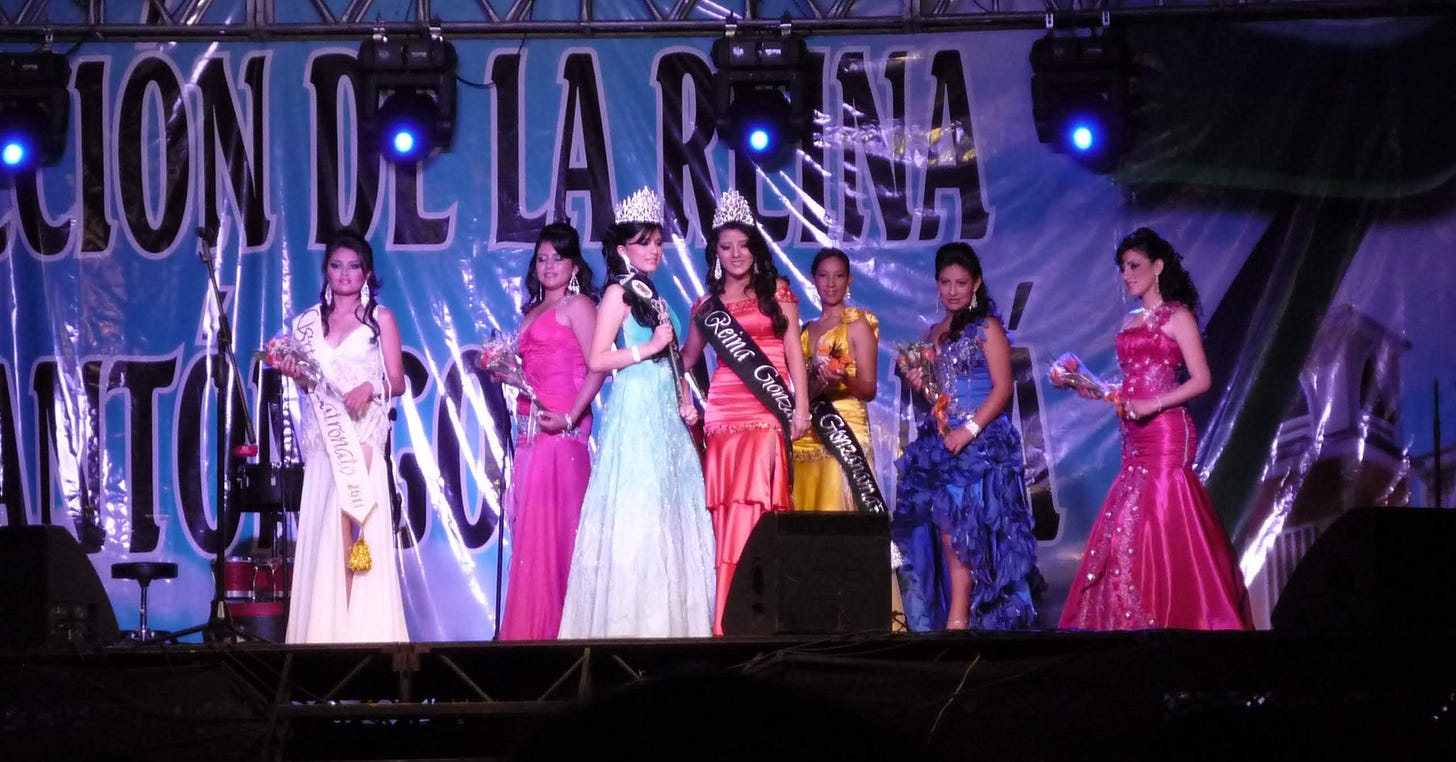
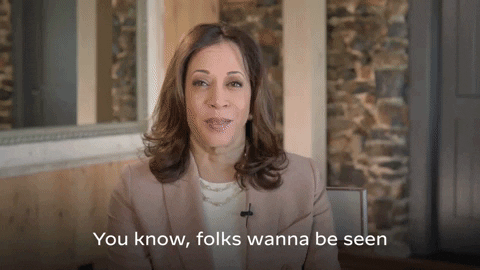
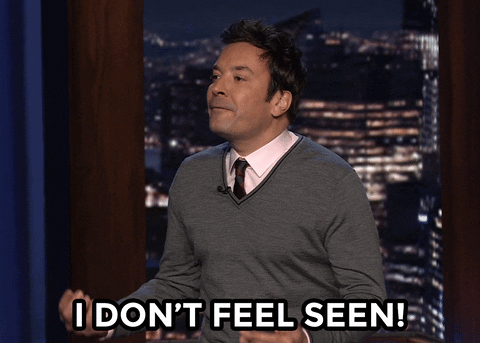


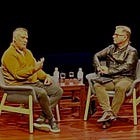
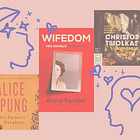
Me gustó mucho este artículo sobre ser visto. En algunas cosas me sentí muy identificada en mi caso, en la adolescencia me sentía constantemente cambiante de invisible a visible, pero visible sin que me vieran de verdad. Objetivizada. En algún momento dejé de sentir ese deseo intenso de ser vista y comencé a ver y a ser y creo que fue entonces que las menores conexiones fueron hechas, algunas perduran hasta hoy. Saludos ❤️.